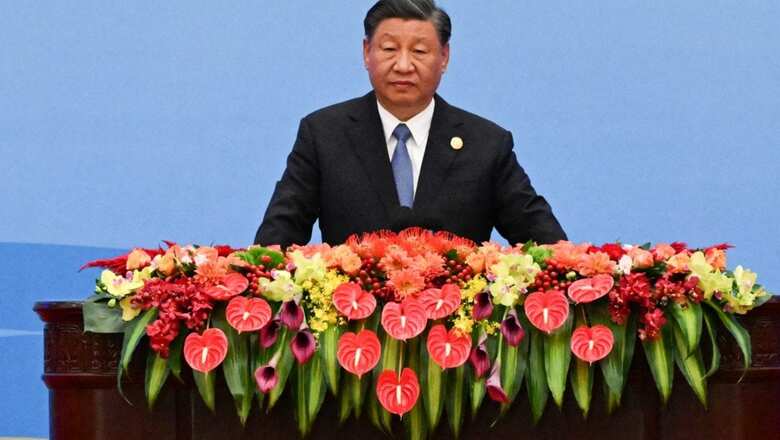
views
On October 17 and 18, Beijing celebrated the 10th anniversary of the One Belt One Road (OBOR) policy. The program hosted 130 countries and leaders of Russia, Pakistan, Indonesia, and other several countries attended the meeting. Beijing for the last few years has been investing heavily in route connectivity. Under this initiative, it is looking forward to different countries for the development of connectivity and mega projects.
Different international institutions highly criticise these policies for their economic viability. Some of the organisations have also called it the ‘One Belt, One Road, And One Debt’ policy. The consequences of such things are also felt in different countries. The third Belt and Road Initiative (BRI) meeting has proposed a Highway Research and Training Centre in Pakistan. This shows how Beijing is looking for new routes throughout the globe.
It is in this light that the competition between India and China for supremacy has assumed varying dimensions, especially in the Indo-Pacific region, which in terms of geo-spatiality, is broadly understood as an interconnected space between the Indian Ocean and the Pacific Ocean. It ranges from the eastern shores of Africa to the western coast of the United States with variations in definitions depending on each actor and their own geographic positioning.
On one hand, India believes in the principles of democracy and the rule of law to ensure sound bilateral relations with countries in these regions. On the other hand, China has gone beyond relying on bilateral agreements and wishes to encompass the whole territory through several projects. One such project is the China-Pakistan Economic Corridor (CPEC) which has been found to violate the territorial sovereignty of India, which is a recognised principle under the UN Charter as well as raised national security concerns. The CPEC focuses on industrial development, building energy and communication infrastructure and is a key artery of China’s BRI connecting western Chinese regions with Pakistan and its ports of Gwadar and Karachi for creating an enduring connection between China, Pakistan, Arabian Sea, the Gulf, and the Middle East. This project fits within the Chinese notion of the Silk Road and Economic Belt, and the 21st-century Maritime Silk Road.
Coming back to India, it has joined projects to create the India-Middle East-Europe Economic Corridor, or IMEC with the US, the European Union, Saudi Arabia, the United Arab Emirates, and other member states as declared at the G20 Summit, which will include a rail link, as well as an electricity cable, a hydrogen pipeline and a high-speed data cable, according to a document prepared by the European Commission. India has rejected claims that the IMEC is an alternative to China’s BRI even as the US and the EU have sought to counter China’s initiative.
The planned corridor would run around 4,800 kilometres (2,982 miles) and have two separate wings. The eastern wing will connect India with the Gulf states and the northern one will go from the Gulf states into Europe.
The ongoing conflict between Hamas and Israel in recent days has likely cast a shadow on this project. The Saudi King, before this war broke out, said in an interview that the route of the plan was slated to be announced around two months after the G20 summit. The rising geopolitical uncertainty means the hopes of normalisation may have been short-lived, at least for now.
The route diplomacy which was started by China is now spreading over the entire world. What this means is that the Chinese through their policies engage in debt trap diplomacy. Such claims draw their legitimacy through certain findings of institutions like the UN Economic and Social Commission for the Asia Pacific that point out that large-scale grants to developing countries could potentially harm the macroeconomic stability of those countries due to the underdeveloped nature of the market and insufficient debt management capacity.
At a larger level, the countries that are becoming economically and politically dependent on China must be supported by India by focusing on poverty alleviation through employment, education, and healthcare provisions with an emphasis on a human needs perspective that focuses on identity, security, recognition, participation, dignity, and justice to reduce their dependence on China and ensure that India’s security and integrity do not get affected.
Abhinav Mehrotra is Assistant Professor and Dr Biswanath Gupta is Associate Professor at OP Jindal Global University. Views expressed in the above piece are personal and solely that of the author. They do not necessarily reflect News18’s views.
















Comments
0 comment